Are cat cafes good for cats?
- Published
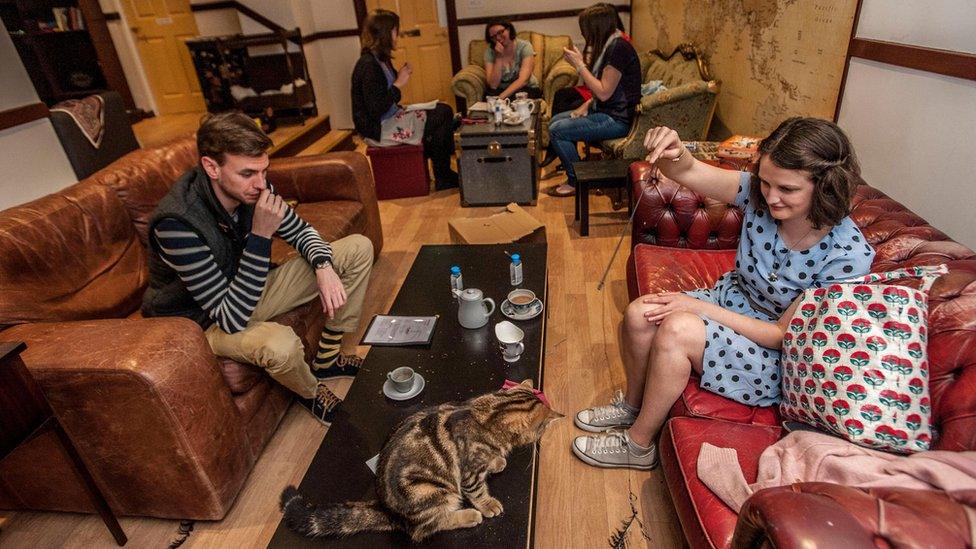
There are nine cat cafes in the UK and the number is rising fast
Most are fully booked well in advance
Some charities, including the RSPCA, say they aren't suitable homes for cats
A black-and-white cat slinks up to the giant wheel in the corner of the room. "Want to get on Lizzie? You look beautiful," cajoles cat carer Mona.
Lizzie hops on to the apparatus, walking with long elegant strokes as the wheel spins around. After a minute she hops off for a head rub and a back scratch from Mona before getting back on again. A gaggle of delighted customers gather and coo at the performance.
Mona heads upstairs to place a food order and Lizzie immediately loses interest in the wheel. As she walks past I put out my hand for her to sniff. She ignores it. She arches her back to avoid a stroke. I can't blame her, I'm one of dozens of strangers who will want to pet her today.
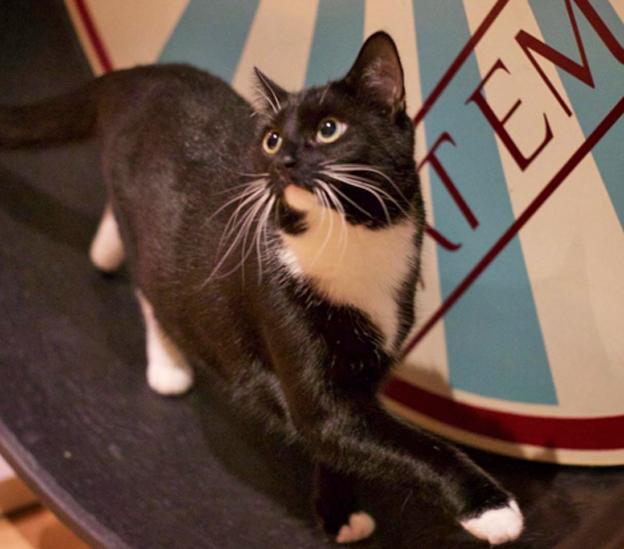
Lizzie takes a stroll on the big wheel
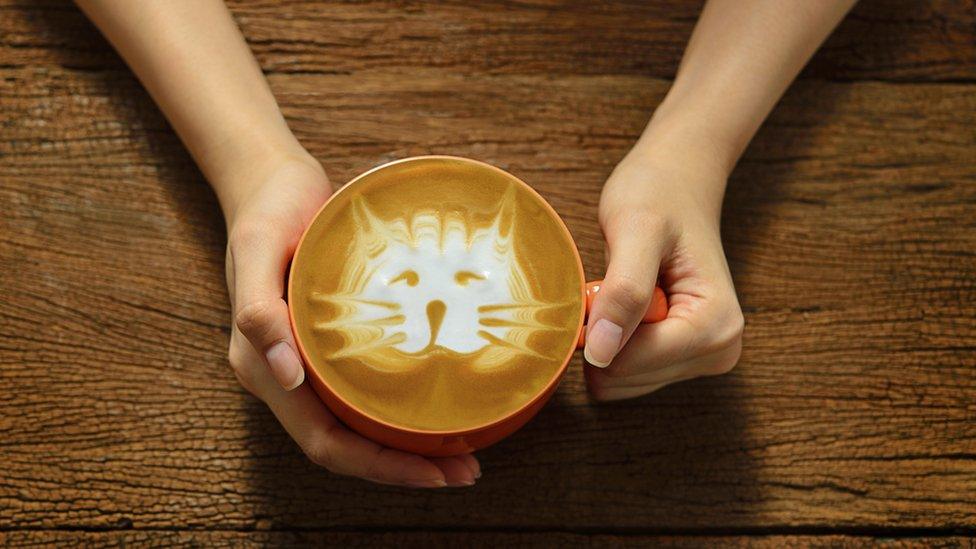
Cat themed drinks are popular
I'm visiting Lady Dinah's Cat Emporium in London's Shoreditch, where 13 resident rescue cats mingle with customers as they drink tea and eat cake. Guests are asked to wash their hands and follow a set of house rules.
"This is their home so we'd ask you not to pick them up, or stroke them while they're sleeping. We encourage you to take pictures but please don't use a flash," I'm told.
Many of the cats are asleep but a handful are active in the downstairs room. They appear healthy and well-groomed and are happy to play, but most shrink from being stroked.
"We have a system where our cats are checked every four hours. We keep track of things like their movement, if they are engaging with people or other cats, when they drink and so on," says cafe founder Lauren Pears.
"We know all of their personalities and we would know if any of our cats were no longer happy in this environment."
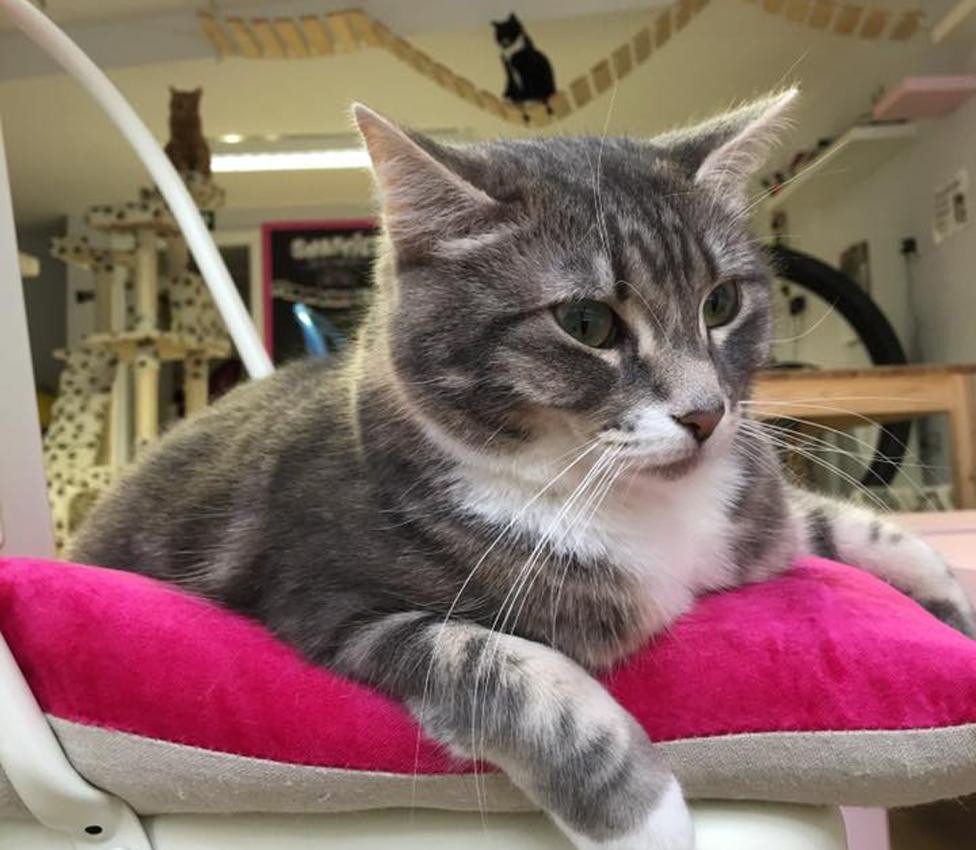
Cat cafes have sprung up all over the world
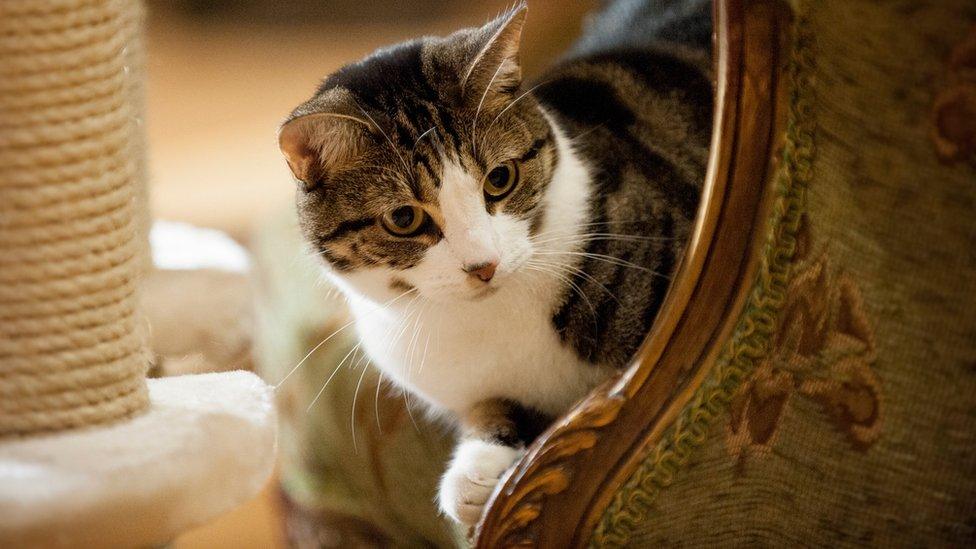
Many cat lovers who can't have animals at home enjoy visiting cat cafes such as Lady Dinah's
The craze for cat cafes began in Taiwan in 1998 then spread to Japan and beyond. Pears opened Lady Dinah's in 2014. As it was the first cat cafe in Britain, it took her a long time to find premises and to persuade Tower Hamlets council to agree to the idea. The cafe was an immediate success with customers and it is still fully booked most days.
Vicky, from Brackley in Northamptonshire, has made a special trip to London as a treat for her niece. She's a cat lover who has no pets of her own at present, and in her view the cafe's residents look happy.
"If the cats didn't like each other you would hear hisses and fights," she says.
There are now eight cat cafes dotted around the UK, with three more due to open by the end of the year, and at least six more in 2017.

Cat cafes
Lady Dinah's Cat Emporium, London
London Cat Village
Kitty Cafe, Nottingham
Mog on the Tyne, Newcastle
Catpawcino on the Quayside, Newcastle
Maison de Moggy, Edinburgh
The Cat in the Window, Aberdeen
Lady T's, Derby
Cat Cafe, Manchester
Opening soon: You and Meow, Bristol; Feline Good Cat Cafe, Cardiff; Streetcat Bob and James Bowen's - Bobs World Cafe, London

But not everyone is happy with their success. A number of animal welfare charities, including Cats Protection, the RSPCA and the Celia Hammond Animal Trust, have criticised the phenomenon, external.
"Cat cafes are not a suitable environment for cats because they are in a confined space with a revolving population of people," says Nicky Trevorrow, behaviour manager at Cats Protection.
"They need a stable environment - more so than dogs."
The RSPCA doesn't recommend keeping large numbers of cats together in one place. "Our main concerns include the stress caused by unfamiliar strangers wanting to stroke and handle the cats," it says.
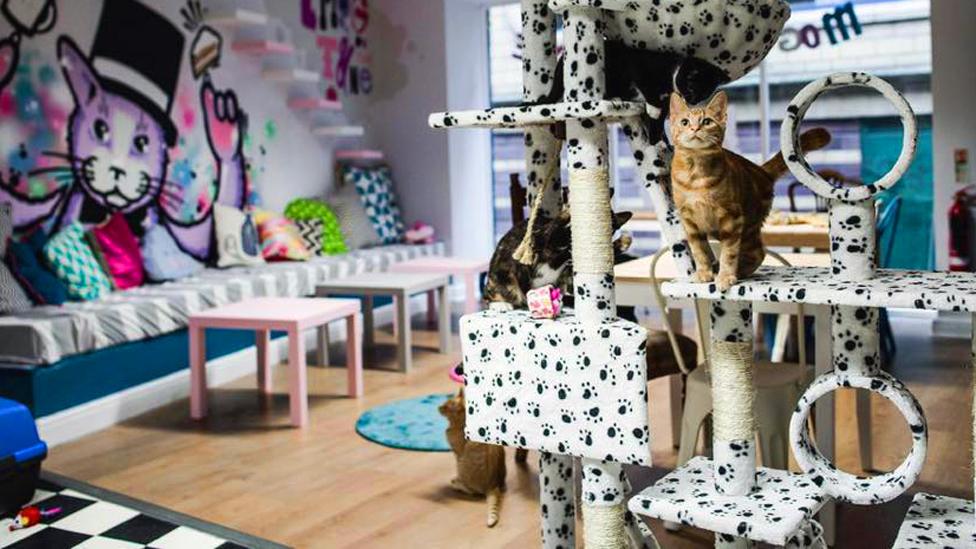
Mog on the Tyne is one of two cat cafes in Newcastle
But while cat cafe owners agree that some animals are not suited for the cafe lifestyle, they say others feel completely at home.
"It is important to pick the right cats as some don't want to be around people all the time," says Katie Jane Glazier, owner of Newcastle's Mog on the Tyne.
"The shelter where we got our 10 cats helped us pick those they thought got on well together and would do well in the environment. They live like a colony."
Pears from Lady Dinah's says any cat that seems to be suffering from stress is rehomed, and both owners point out that they have areas their cats can retreat to away from customers. But this doesn't completely reassure Trevorrow.
"It's a good start to offer places the cats can get away, but it's not enough," she says.
"Cats can be extremely subtle at showing stress such as 'fake sleeping'. They look like they are relaxing but actually they are hyper-vigilant listening to their surroundings.
"Also, cat cafes are generally indoor spaces but most cats would benefit from outdoor space where they can roam and exhibit natural behaviours - indoor enrichment can't compete with the sights and smells of outside."
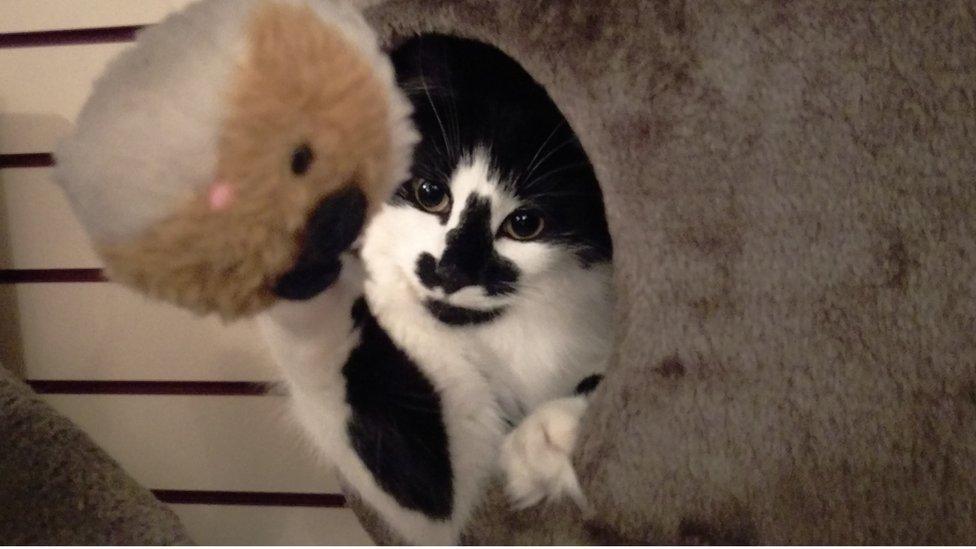
Carbonelle in Lady Dinah's cafe
Some cat charities take a more positive view, however.
"It is a difficult environment to get right but it's not impossible by any means," says Andy Sparkes, veterinary director at International Cat Care.
"While cats are solitary animals, domestic cats have evolved and many are able to live in groups quite happily."
He adds: "I've seen cats in some poorly run re-homing centres, where there are many confined to one room. That can be far more stressful."
All the charities agree on one point - cat cafes need to be properly regulated.
At present they only need to meet food safety requirements and it's up to each cafe to set its own animal welfare standards.
One cat cafe in Leicester was shut down weeks after opening in 2015 due to hygiene concerns. Dominic Shellard, vice chancellor of De Montfort University in Leicester, tweeted that he was "very disturbed" when he visited it, describing an "overpowering smell of cat faeces" and "very sad" cats.
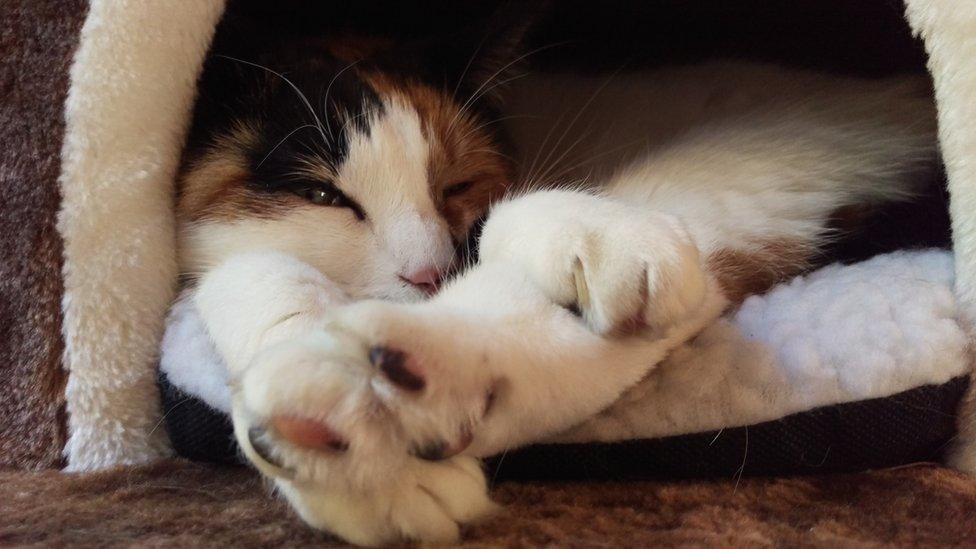
Cats naturally sleep for about 16 hours a day
"As it's a new, novel idea there are no minimum standards or policies," Trevorrow says. "Cat cafes vary hugely how they are managed and some aren't good at checking that customers don't harass or feed the cats."
A frequent criticism on review websites is that customers, particularly children, chase cats around the premises. Some only allow guests aged over 12, but others admit two-year-olds.
There's also no minimum space requirement per cat.
One argument in favour of cat cafes is that they can double up as adoption centres - the approach taken at Kitty Cafe in Nottingham.
"The cafe allows the cats to interact and show off their personality, which they couldn't in a cage," says owner Kate Charles-Richards. "Too often cats are overlooked in shelters because they aren't 'pretty'."
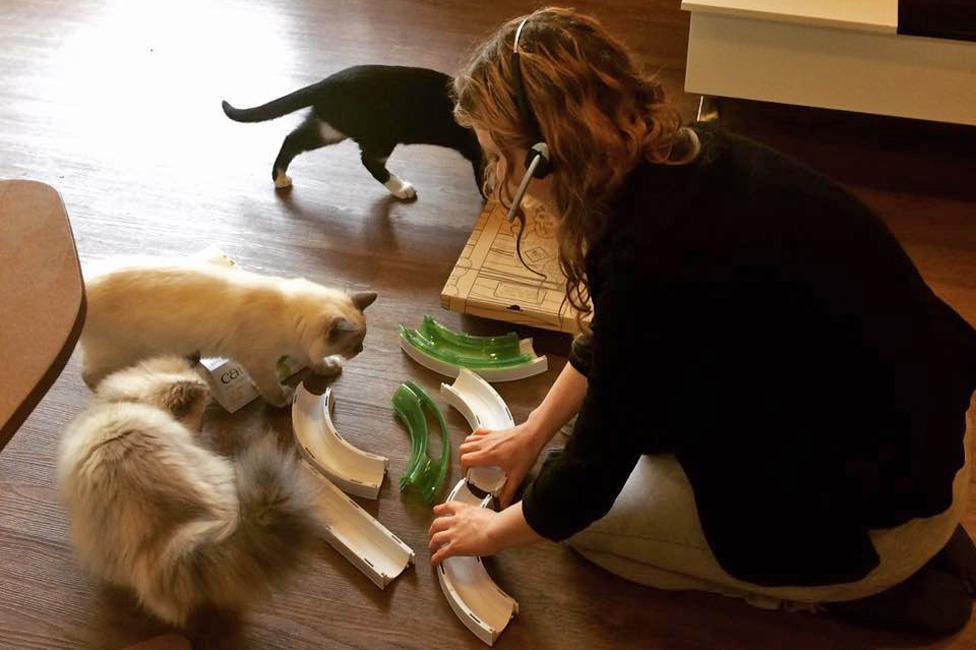
Kate Charles-Richards prepares new toys at Kitty Cafe in Nottingham
Kitty Cafe has rehomed around 60 cats since it opened in March 2015, with 300 potential owners on a waiting list.
"Cat numbers go up and down but we generally have between 25 and 30 and we can have 60 people visiting at one time. We accept rescue animals and introduce them to the cafe gradually over 30 days.
"They can go where they like during the day including the cattery, the cat snug - which is closed to customers - and the cafe floor."
Charles-Richards is so convinced of the model's success she is planning to roll it out across the UK.
"In 2017 we hope to set up five Kitty Cafe franchises. My team will manage the well-being of the cats and the franchisee would take charge of the cafe as a whole."
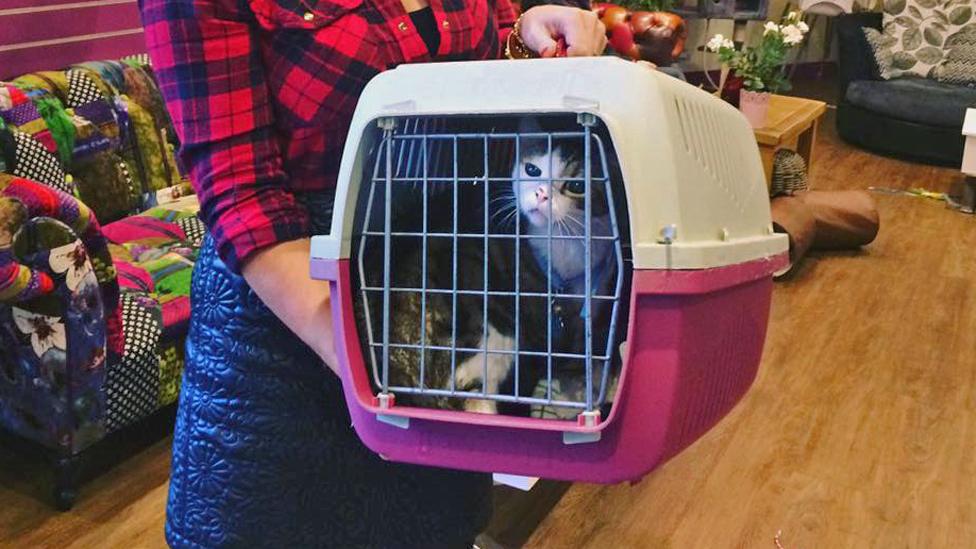
One of the Kitty Cafe residents on her way to her new home
Animal charities are certainly struggling with the number of homeless cats. According to the RSPCA its shelters are "full to capacity". It housed 31,556 cats in 2012, up 8% on 2010. The charity blames irresponsible cat owners, who allow their pets to breed unchecked. One female can produce 18 kittens a year. The number of stray cats in the UK is estimated at nine million, exceeding the 7.4 million kept as pets.
But Nicky Trevorrow of Cats Protection is not convinced about the Kitty Cafe idea. "I think some rehoming centres do need to improve their facilities but I don't think cat cafes are the answer," she says. "They don't meet the needs of cats."
The RSPCA, for its part, says it would far prefer people yearning for feline company to volunteer at a local shelter rather than visit a cat cafe.
In Lady Dinah's, I watch Lizzie hop off a perch and head upstairs. Has she gone in search of Mona? Did she just want to get away from me? With cats it's often hard to tell.
Follow Claire Bates on Twitter @batesybates, external
Follow @BBCNewsMagazine, external on Twitter and on Facebook, external